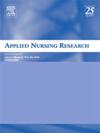Hypoglycemia knowledge assessment tool — Development and validation of the Hypoglycemia Management Knowledge Scale in Taiwan
IF 2.2
4区 医学
Q1 NURSING
引用次数: 0
Abstract
Background
Knowledge can guide and support behaviors. With accurate knowledge, patients are better equipped to engage in appropriate self-care behaviors and effectively manage hypoglycemia. However, there is currently a lack of reliable and valid assessment scales specifically designed to measure hypoglycemia knowledge, which could serve as valuable clinical evaluation tools for healthcare professionals.
Aim
To develop and validate a reliable and valid hypoglycemia management knowledge scale to assess the knowledge of hypoglycemia management in patients with diabetes.
Methods
A cross-sectional study was conducted, recruiting 300 patients with type 2 diabetes who had experienced hypoglycemic events from a medical center and a primary care clinic in southern Taiwan between December 2021 and September 2023.
Results
Initially, 25 questions were selected, achieving a content validity index of 0.92. Through exploratory factor analysis and confirmatory factor analysis, the scale was refined into an 8-factor and 3-factor model, with factor loadings ranging from 0.5 to 0.9. The questions were categorized into three factors: blood glucose determination, carbohydrate supplementation, and blood glucose testing. The internal consistency, measured using the Kuder-Richardson 20 (KR-20), was 0.758.
Conclusions
The hypoglycemia management knowledge scale developed in this study demonstrated sufficient validity and reliability, making it a useful tool for quickly assessing patients' knowledge of hypoglycemia management and serving as a reference for hypoglycemia education.
低血糖知识评估工具-台湾地区低血糖管理知识量表之开发与验证
背景知识可以指导和支持行为。有了准确的知识,患者就能更好地进行适当的自我护理行为,有效地控制低血糖。然而,目前还缺乏专门设计的可靠有效的低血糖知识评估量表,可以作为医疗专业人员有价值的临床评估工具。目的制定并验证一套可靠、有效的降糖管理知识量表,以评估糖尿病患者的降糖管理知识。方法采用横断面研究方法,在2021年12月至2023年9月期间,从台湾南部的一家医疗中心和一家初级保健诊所招募了300名经历过低血糖事件的2型糖尿病患者。结果初步筛选出25个问题,内容效度指数为0.92。通过探索性因子分析和验证性因子分析,将量表细化为8因子和3因子模型,因子负荷范围为0.5 ~ 0.9。这些问题分为三个方面:血糖测定、碳水化合物补充和血糖测试。使用库德-理查德森20 (KR-20)测量的内部一致性为0.758。结论本研究编制的低血糖管理知识量表具有足够的效度和信度,是快速评估患者低血糖管理知识的有效工具,可作为低血糖教育的参考。
本文章由计算机程序翻译,如有差异,请以英文原文为准。
求助全文
约1分钟内获得全文
求助全文
来源期刊

Applied Nursing Research
医学-护理
CiteScore
4.50
自引率
0.00%
发文量
65
审稿时长
70 days
期刊介绍:
Applied Nursing Research presents original, peer-reviewed research findings clearly and directly for clinical applications in all nursing specialties. Regular features include "Ask the Experts," research briefs, clinical methods, book reviews, news and announcements, and an editorial section. Applied Nursing Research covers such areas as pain management, patient education, discharge planning, nursing diagnosis, job stress in nursing, nursing influence on length of hospital stay, and nurse/physician collaboration.
 求助内容:
求助内容: 应助结果提醒方式:
应助结果提醒方式:


